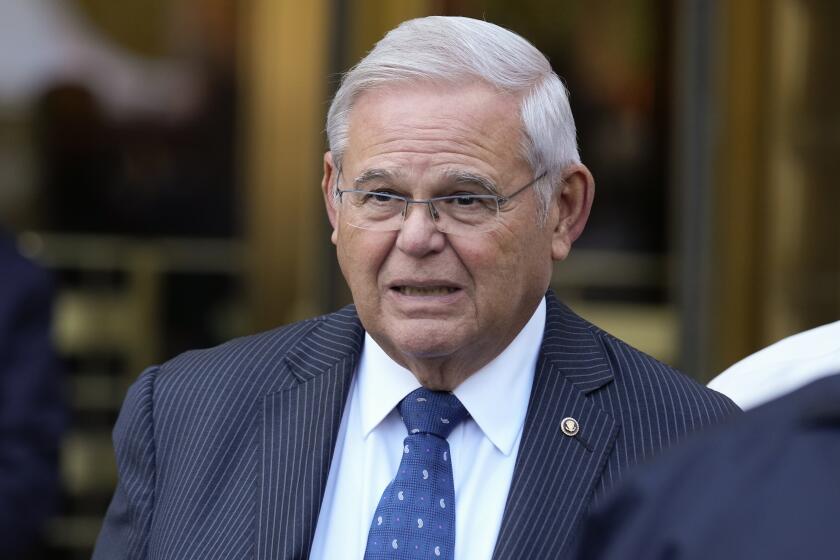Israel, PLO Agree to More Self-Rule : Mideast: Negotiations yield early transfer of some powers Sept. 12. Palestinians will set up tax system to fund programs.
Israel and the Palestine Liberation Organization initialed an agreement Wednesday on early transfer of civilian powers to Palestinians living in the Israeli-occupied West Bank.
After a negotiating session that lasted into the night Tuesday, resumed Wednesday morning and finally ended at night, Israel said it would transfer authority on Sept. 12 to Palestinians for collecting taxes and for running health, welfare and tourism facilities throughout the West Bank.
“Today is the real start for the implementation of the peace agreement on the West Bank,” Palestinian negotiator Nabil Shaath told reporters in Cairo.
Even as negotiators there were still finishing their accord, the first transfer of a civilian portfolio in the West Bank to Palestinians was already under way.
Israeli authorities formally turned over the Ramallah school district to Palestinians, in keeping with a separate agreement reached in Cairo last week, and promised that the rest of the West Bank education system will be turned over to Palestinians by Monday.
“This is a far-reaching, most important step,” Israeli Foreign Minister Shimon Peres told Israel Radio about the education transfer. “I think we are acting wisely in not forcing our education on them, leaving them to educate in their own way.”
The transfer of responsibility for civilian affairs is meant to give Palestinians in the West Bank--who still live under Israeli military rule--tangible evidence that Israel and the PLO are working toward an agreement to let Israel redeploy its troops out of Palestinian population centers and permit Palestinians to conduct local elections and run their daily lives.
But Israel’s military administration of the territories will continue alongside the Palestinian bureaucracy for at least a year, Israeli officials said. The Israeli administration will not be dissolved until elections are held in the territories and Israel’s troops are redeployed.
“There will have to be cooperation,” Shaath told reporters in Cairo. “We will need goodwill and a lot of cooperation; it will not work any other way.”
Both Israeli Prime Minister Yitzhak Rabin and PLO Chairman Yasser Arafat face rising opposition in their constituencies to the step-by-step disengagement process.
In Israel, members of Rabin’s Cabinet and the main opposition party, Likud, have accused the PLO of failing to control Hamas, an Islamic extremist group, and of failing to keep its promise to cancel parts of the Palestine National Charter calling for Israel’s destruction.
Likud has called on Rabin to stop all negotiations with the Palestinians. Economics Minister Shimon Shetreet on Wednesday insisted that the early powers agreement will not take effect before the Cabinet votes on it; he said the Cabinet must be satisfied that the PLO is living up to its commitments.
In response to critics, Rabin said Wednesday that he will bring the agreement to the Cabinet for a vote Sunday and expects to sign it, once ratified, in a ceremony with Arafat next week.
Among Palestinians, opposition to canceling the charter clauses offensive to Israel is so intense that officials admit privately they probably cannot get the two-thirds vote from the Palestine National Council to annul them. But Arafat wrote to Rabin a year ago promising the clauses would be canceled.
“We know that Arafat has a problem here,” a Rabin aide said. “But he made a commitment and he must keep that commitment.”
The question of whether and when to convene a national council meeting in Gaza has become a lightning rod for Arafat critics, who fault the agreement he signed with Israel and his authoritarian style of governing in the territories.
On Tuesday, Arafat was presented with a petition signed by a third of the national council, opposing any charter alteration.
Meeting with members of the ruling Israeli Labor Party in Gaza on Wednesday, Arafat dismissed the petition.
Faced with charges from Palestinians that he has merely relieved Israel of the burden of administering Gaza, where more than 800,000 Palestinians live, and with growing challenges to his leadership, Arafat was eager to show that Israel was willing to honor its commitment and extend self-rule to the West Bank.
Israelis and Palestinians consider the West Bank a far more complex problem than the Gaza Strip, because there is so much more at stake.
For Rabin, there is the problem of how to ensure the security of tens of thousands of Jewish settlers whose communities are scattered across the West Bank. In Gaza, the handful of settlements are mostly concentrated in the north and are relatively easy for Israel’s army to protect.
For Arafat, there is the problem of how to extend his authority to a far more sophisticated and wealthy population with much higher expectations than the Gazans.
There also is the unresolved problem of Jerusalem. Palestinians claim it as the capital of their future state; Israelis say its status as the undivided capital of Israel is non-negotiable.
Jerusalem’s fate is to be decided in negotiations on the territories’ final status, which will not begin for at least another two years.
Talks on transferring some civilian powers to the Palestinians got under way in Cairo on July 11 but were derailed several times by disputes over security in Gaza, release of Palestinian political prisoners and Israel’s fear that the Palestinian Authority will be unable to fund civilian operations throughout the West Bank.
The toughest agreement for the sides to reach, Israelis and Palestinians say, was on taxation. Israel insisted that Palestinians must collect income tax to fund self-rule. But the Palestinians have no infrastructure to do so.
In the end, Israel agreed to help the Palestinians set up an income tax system.
More to Read
Start your day right
Sign up for Essential California for news, features and recommendations from the L.A. Times and beyond in your inbox six days a week.
You may occasionally receive promotional content from the Los Angeles Times.






